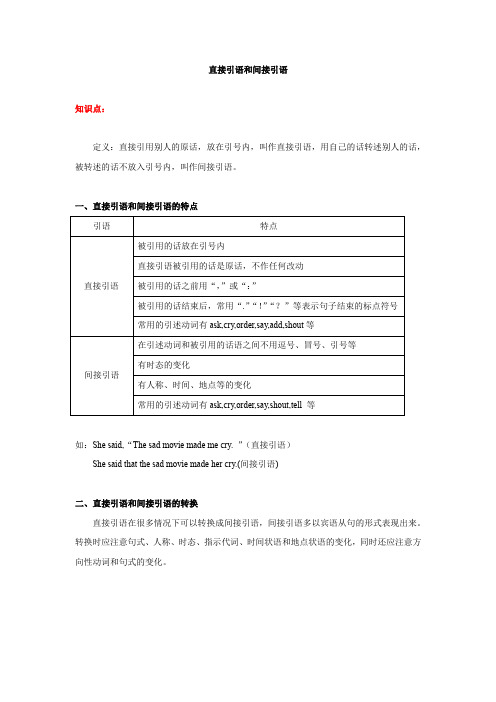中考专项复习-直接引语和间接引语
- 格式:ppt
- 大小:394.00 KB
- 文档页数:11

中考中的直接和间接引语知识点归纳与总结直接和间接引语是英语语法中一个重要的知识点,也是中考考试中的常见题型。
掌握好直接和间接引语的用法和转换规则,对于理解和运用英语语言的能力至关重要。
本文将对中考中的直接和间接引语知识点进行归纳与总结。
一、直接引语的用法和标点符号直接引语是指直接引用他人的原话或者句子。
在书写时,直接引语需要使用引号将其括起来。
示例:1. "I love watching movies," Tom said.在这个例子中,直接引语为"I love watching movies",用引号括起来,并使用逗号将直接引语与引语的说话人分开。
2. "What time is it?" Mary asked.同样地,直接引语为"What time is it?",也同样使用引号括起来。
需要注意的是,在一些特殊情况下,需要使用其他标点符号。
例如,当直接引语包含疑问句、感叹句等特殊语气时,需要根据原句的标点符号进行调整。
示例:1. "What a beautiful day!" she exclaimed.在这个例子中,直接引语为"What a beautiful day!",为感叹句形式。
直接引语前使用感叹号,并使用逗号将直接引语与引语的说话人分开。
二、间接引语的用法和转换规则间接引语是指将直接引语转换为自己的话来表达他人的意思。
在书写时,间接引语不需要使用引号。
示例:1. Tom said that he loved watching movies.在这个例子中,直接引语"I love watching movies"被转换为间接引语"he loved watching movies",不再使用引号。
需要注意的是,转换直接引语为间接引语时,需要进行人称、时间和地点等方面的转换。



中考英语直接引语与间接引语专项练习班级考号姓名总分Part1 基础巩固单项选择。
( )1.-What did your teacher say to you just now?- He told me that two thirds of the earth with water.A.is coveringB.are coveringC.was coveredD.is covered( )2.-What did your son say in the letter?- He told me that he the Disney World the next day.A.will visitB.has visitedC.had visitedD.would visit( )3.-Did he say anything about himself yesterday?- Yes.He told me that he English since he came here.A.has taughtB.had taughtC.taughtD.was teaching( )4.-What did your father say?- He told me I stop staying up every night like that.A.mayB.shouldC.canD.could( )5.-Could you tell me ?It is said that he was born in Canada.A.what he is likeB.when he was bornC.how he is likeD.where he is from( ) 6.Excuse me, would you please tell me ?A.how we can get to the post officeB.how can we get to the post officeC.how get to the post officeD.how could we get to the pose office( )7.-What an interesting book it is! Could you tell me .- From a bookstore called Zhongshuge in Yangjiaping.A.when did you get itB.when you got itC.where did you get itD.where you got it( )8.-What did Mr.Black say to you just now?- He asked us the next day.A.what would the weather be likeB.what will the weather be likeC.what the weather would be likeD.what the weather was like( ) 9.Excuse me, would you please tell me ?A.when the sports meet is taken placeB.when is the sports meet going to be heldC.when is the sports meet to beginD.when the sports meet is to take place( )10.-Excuse me, could you tell me ?- Sure.You can take the No.32 bus.A.is there a bus to the zooB.which bus I should take to the zooC.whether can I take a bus to the zooD.where I should take a bus to the zoo( ) 11.-Can you tell me ?-Sure.You can take the K2 bus.A.where the high-speed rail station isB.where is the high-speed rail stationC.how I can get to the high-speed rail stationD.how can I get to the high-speed rail station( ) 12.-Do you mind telling me ?- Of course not.Remember "Keep moving”.A.if I can lose weightB.where I can lose weightC.how I can lose weightD.why I lose weight( )13.-What did your teacher say to you just now?- He asked me .A.how could I deal with itB.when did I go to the libraryC.why I am late for schoolD.if I had got ready for the exam( ) 14.-What did our English teacher say to you just now?- He asked me .A.how I planned to go on vacationB.if had I done my homeworkC.when did I do my homeworkD.what I will do during the following weekend( )15.-What did the foreigner say to you just now?He asked me .A.that he can get to Confucius Temple on footB.that he could get to Confucius Temple on footC.whether he can get to Confucius Temple on footD.whether he could get to Confucius Temple on foot·Part 2 难点突破一、单项选择。


直接引语和间接引语知识点:定义:直接引用别人的原话,放在引号内,叫作直接引语,用自己的话转述别人的话,被转述的话不放入引号内,叫作间接引语。
一、直接引语和间接引语的特点引语特点直接引语被引用的话放在引号内直接引语被引用的话是原话,不作任何改动被引用的话之前用“,”或“:”被引用的话结束后,常用“.”“!”“?”等表示句子结束的标点符号常用的引述动词有ask,cry,order,say,add,shout等间接引语在引述动词和被引用的话语之间不用逗号、冒号、引号等有时态的变化有人称、时间、地点等的变化常用的引述动词有ask,cry,order,say,shout,tell 等如:She said,“The sad movie made me cry. ”(直接引语)She said that the sad movie made her cry.(间接引语)二、直接引语和间接引语的转换直接引语在很多情况下可以转换成间接引语,间接引语多以宾语从句的形式表现出来。
转换时应注意句式、人称、时态、指示代词、时间状语和地点状语的变化,同时还应注意方向性动词和句式的变化。
1.人称的变化直接引语在变为间接引语时,人称代词的变化通常遵循“一随主、二随宾,第三人称不更新”的原则。
“一随主”原则:直接引语中的第一人称代词(I,we)变为间接引语时,须与引述动词的主语在人称和数上保持一致。
直接引语:“It was exactly what I needed,"he said.间接引语:He said that it was exactly what he needed.他说这正是他所需要的。
(He为引述动词的主语)“二随宾”原则:直接引语中的第二人称代词(you)变为间接引语时,须与引述动词的宾语在人称和数上保持一致。
直接引语:My teacher told me," You should be on time next time."间接引语:My teacher told me that I should be on time next time.我的老师告诉我下次应该准时。
直接引语和间接引语知识点详解(初中英语专项复习)一、直接引语和间接引语的概述在直接引用别人的原话时,被引用的句子称为直接引语。
在用直接引语时,引语前后都要加引号。
引导引语的动词称为引用动词,如:say, ask, answer, reply等。
引用动词多数放在后面,有时放在前面,间或插在引语中间。
在把引用动词放在后面时,有时主语和动词位置可以颠倒(特别是主语较长时)。
【例】“Who is it?” Ann shouted.“I never eat meat,” she explained.“Sit up,” he commanded, “and hold out your hands.”当用自己的话转述别人的话时,被转述的部分称为间接引语。
这时被引语部分常常是引用动词的宾语。
在多数情况下,引语都由连词that引导,但在say, tell等词后可以省略。
【例】He said (that) he had lost the bag.Tell her I am out.二、把直接引语变成间接引语时,要改变的内容1.要根据意思改变人称。
2.要根据时态呼应的原则把时态加以调整。
3.指示代词、时间状语、地点状语和动词也需要作必要的变动。
三、各种句式变间接引语时要发生的变化1.陈述句直接引语如果是陈述句,变为间接引语时,用连词that引导(that可省略)。
【例】Tony said to me, “ I will leave this book in your desk.”→Tony told me (that) he would leave that book in my desk.如果直接引语是表示建议、要求、推测、判断的陈述句,变为间接引语时,可以变为动词不定式、V-ing形式或含虚拟语气的宾语从句。
【例】Jane said to Tony, “You’d better ask your friends for some advice.”→Jane advised Tony to ask his friends for some advice.→Jane suggested Tony asking his friends for some advice.→Jane advised/suggested that Tony (should) ask his friends for some advice.2.一般疑问句、选择疑问句和反意疑问句直接引语是一般疑问句,变为间接引语时,要用连词whether或if引导,同时把原来的疑问句语序变为陈述句语序。
直接引语和间接引语知识点详解(初中英语专项复习)
直接引语:直接引述别人的话,用引号“”括示;间接引语:转述别人的话,不用引号“ ”括示。
直接引语改为间接引语时,如引述动词为过去时,间接引语中的动词、时间、时态、地点、人称等一般要作相应的变化。
应遵循下列规律:
1.各种句型的直接引语改成间接引语时的相应变化:
2.直接引语变间接引语时,几种时态不变的特殊情况:
3.指示代词、时间、地点、时态、少数动词以及人称等一般要作相应的变化。
二重点难点必记(一)使用宾语从句应注意的几个问题。
中考英语复习-直接引语和间接引语语法要点:直接引语和间接引语属于宾语从句范畴。
直接引述别人的原话,叫直接引语;用自己的话转述别人的话,或引用自己说过的话,叫间接引语。
由于时间、地点以及人物都有可能起变化,所以间接引语中的时态、人称、语序、指示代词、时间状语、地点状语等要作相应的变化。
1. 直接引语和间接引语的转换方法①间接引语语序改为陈述句语序陈述句用that 引导,口语中常省略She said,例:“I am going to the cinema. ”→She said (that) she was going to the cinema.②一般疑问句用if/whether连接,例:“Have you ever travelled by plane?”she asked me.→She asked me if / whether I had travelled by plane.③反意疑问句用if/whether连接,例:He asked,“You are a doctor,aren’t you?”→He asked (me) if / whether I was a doctor.④特殊疑问句由原疑问词连接(如疑问代词是主语,不要改变语序),例:He asked, “Who will come to help us?”→He asked who would come to help them.She said, “Where have you been,Simon?”→She asked Simon where he had been.⑤选择疑问句由whether…or 引导,例:Eddie said, “Is this a TV set or a computer?”→Eddie asked (me) whether that was a TV set or a computer.⑥祈使句用“tell /ask /order someone (not) to do something”结构,将动词原形变为动词不定式,例:“Put up your hands,”said the teacher.→The teacher told them to put up their hands.“Don’t play football on the street,”the policeman said.→The policeman ordered us not to play football on the street. 词语辨析1.in front of, in the front ofin front of的意思是“在……前面”?如:There is a tree in front of the house。